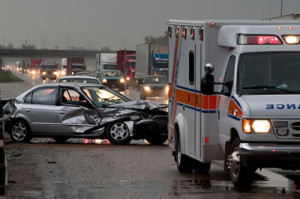What Is Fault?
Fault is when an entity intentionally or negligently fails to act reasonably, according to legal standards or one’s duty, resulting in harm to another person. This failure can arise from various factors such as ignorance, carelessness, negligence, or a lack of skill. If actions like not being aware, not taking proper precautions, disregarding others, or lacking necessary skills lead to injury to another person, they can all be considered as fault.
Legal scholar John C. Jeffries Jr. states, “Fault is the linchpin of tort liability.” Fault plays a crucial role in various aspects of law, including tort law (civil wrongs), contract disputes, and criminal law. Establishing fault is essential in legal proceedings to determine liability and to assess damages or penalties accordingly.
Fault forms the basis for legal liability and compensation. For example, in a car accident case, fault may be assigned based on factors like speeding, failure to yield, or distracted driving. For plaintiffs seeking damages, proving fault is essential to demonstrate that the defendant’s actions or negligence directly caused their injuries or losses. Conversely, defendants may argue mitigating circumstances or lack of fault to defend against legal claims.
More information about Fault
Hazleton Bicycle Accident Lawyer
If you were hurt in a bicycle accident in Hazleton, our attorneys can help you collect just compensation. Call today to speak with an experienced personal injury lawyer for free.
 Whether you ride for fun, exercise, or transportation, as a cyclist in Hazleton, you are at risk for being injured by a negligent driver. Bicycle accidents are alarmingly common. In most cases, it is a careless or distracted driver who is to blame. If you were run off the road or injured in a collision involving a motor vehicle, you deserve just compensation. With decades of experience and millions of dollars recovered, our attorneys can help maximize your financial recovery for your medical expenses, loss of income, pain and suffering, and other losses.
Whether you ride for fun, exercise, or transportation, as a cyclist in Hazleton, you are at risk for being injured by a negligent driver. Bicycle accidents are alarmingly common. In most cases, it is a careless or distracted driver who is to blame. If you were run off the road or injured in a collision involving a motor vehicle, you deserve just compensation. With decades of experience and millions of dollars recovered, our attorneys can help maximize your financial recovery for your medical expenses, loss of income, pain and suffering, and other losses.
At Munley Law Personal Injury Attorneys, we have been representing accident victims in Hazleton since 1959. […]
Read MoreMore information about Fault
Hazleton Premises Liability Lawyer
If you’ve been injured at someone else’s home or a place of business in Hazleton, you may be entitled to compensation for your injuries. Property owners have a responsibility to keep their properties free from hazards. But if you suffer an injury on someone else’s property caused by hazardous conditions, the homeowner, landlord, or proprietor may be held accountable. Not sure if you have a case? Contact a Hazleton premises liability lawyer at Munley Law Personal Injury Attorneys for a free consultation to get the answers you need.
The premises liability lawyers at Munley Law Personal Injury Attorneys work diligently on behalf of our clients in the Hazleton area to investigate and document the negligence of a property owner and seek maximum compensation for the injured. Our board-certified attorneys have recovered millions of dollars for slip and fall, dog bite, […]
Read MoreMore information about Fault
School Bus Accident Lawyer
If your child suffers an injury while riding a school bus, you may have grounds for a lawsuit. A school bus accident lawyer at Munley Law Personal Injury Attorneys can help you get the compensation you deserve.
When your child has been hurt, you need legal representation you can trust. Since 1959, families throughout Pennsylvania and across the U.S. have turned to the personal injury lawyers at Munley Law Personal Injury Attorneys. Our attorneys have been named among the Best Lawyers in America (via the national legal guide Best Lawyers), Best Law Firms (via U.S. News and World Report), and Pennsylvania’s Super Lawyers. We have built a national reputation on our dedication to accident cases involving large vehicles like trucks and buses. Most importantly, our lawyers get results.
Contact Munley Law Personal Injury Attorneys today for a free consultation. A school bus accident lawyer will review your claim at no charge, […]
Read MoreMore information about Fault
OSHA Helps Trucker Fired for Refusing to Break Safety Rules
 It’s a tough call that truck drivers are often forced to make.
It’s a tough call that truck drivers are often forced to make.
A trucker was assigned to transport a load of Poland Spring water from Massachusetts to New Jersey. A severe thunderstorm causing flooded roads and heavy traffic slowed him down considerably, and he realized he would not be able to complete the delivery and return home without violating the federal hours of service regulations intended to prevent overworked truckers from becoming a danger on the highways. So, he delivered the shipment to a closer facility; the trucking company and the customer approved the arrangement, and another driver carried the shipment to its final destination.
He was fired the next day for insubordination.
The driver filed a complaint with the Occupational Safety and Health Administration, who stepped in to help. According to one of their administrators:
“The law is clear: Drivers have the right to raise legitimate safety concerns to their employer – including refusing to violate safety regulations – without fear of termination or other retaliation. […]
Read MoreMore information about Fault
Don’t Call it a Car “Accident”
 Safety advocates are trying to change the way we talk about motor vehicle crashes.
Safety advocates are trying to change the way we talk about motor vehicle crashes.
Mark Rosekind, head of the National Highway Transportation Safety Administration said that the term car “accident” implies that it was no one’s fault, it could not have been prevented or foreseen.
In reality, more than 90% of collisions are caused by driver error – drinking, distracted driving, speeding, and other risky behavior. Relatively few are true “accidents,” caused by uncontrollable situations like a mechanical malfunction, icy roads, or other factors.
So what difference does it make? Why does it matter what word we use to describe these incidents? Road fatalities are on the rise. Safety officials, lawmakers, and aggrieved families feel strongly that language reflects our attitudes, which affect policy. When the language we use implies that nothing could have been done to prevent a tragic “accident,” […]
Read More











